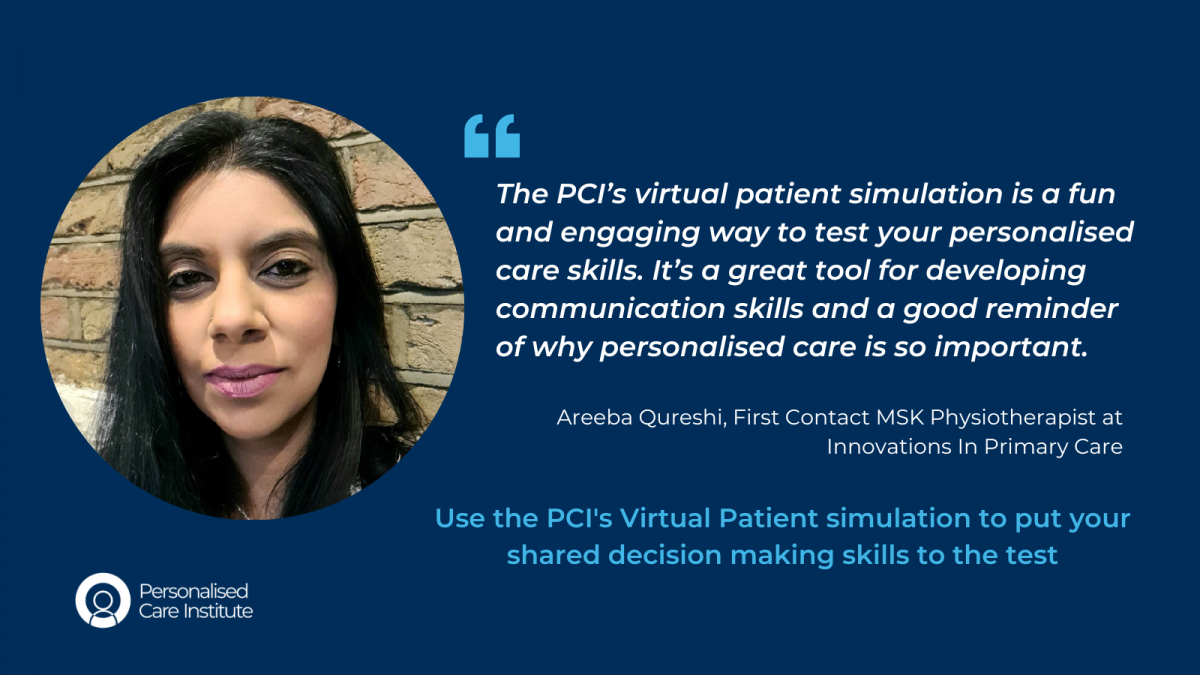Areeba Qureshi says virtual reality training tool will boost physios' shared decision-making skills
Areeba Qureshi is urging her fellow physiotherapists to develop their skills in shared decision-making processes through accessing a free training programme. A musculoskeletal physio, Areeba is an ambassador for the Personalised Care Institute (PCI), which unveiled an innovative virtual reality training course today (18 April).
She said: ‘The PCI’s virtual patient simulation is a fun and engaging way to test your personalised care skills,’ she said. ‘It makes you really think about how you are responding to patients and –from the comprehensive feedback you receive – you can see what areas you are stronger in and where you can improve your shared decision-making skills.'
Areeba, who works for Innovations in Primary Care in West Sussex, added: ‘It’s a great tool for developing communication skills and a good reminder of why personalised care is so important.’

What's involved?
The Virtual Patient Simulation: Test your personalised care conversations is a quality-assured eLearning tool aimed at health and care professionals, whatever their level of seniority or experience. Users are invited to test their SDM skills through following a series of lifelike simulated patient consultations.
Each consultation is broken down into three distinct areas
- introduction and understanding the patient’s history
- exploring preferences relating to treatment options
- reaching a shared decision on the way forward
Users are given multiple choice questions to provide structured interactions with an on-screen animated patient character. They can explore a range of conversation pathways and techniques in a risk-free environment, free of the pressures that can accompany being under observation. Comprehensive feedback is provided at the end of each exercise, with users being able to put their learning to the test through repeating the exercise.
The first two scenarios to be launched are an in-person consultation based on an osteoarthritis discussion and a remote consultation by telephone with a father concerning his son’s sore throat. Two further scenarios – a referral for suspected bowel cancer and a discussion around the ongoing use of antidepressants – are in the pipeline and are scheduled to be released in the coming months.
Research has shown that virtual patient tools offer a range of educational benefits for healthcare professionals, such as supporting learning relating to communication, understanding, decision-making, clinical reasoning and problem-solving. Meanwhile, simulations have been found to encourage greater engagement and facilitate repetitive practice, with the added benefit that learning can be completed by the healthcare professional at their own pace.
Filling a knowledge gap
This free learning tool has been designed to provide health and care practitioners at every level with a quick and easy way to test and develop their personalised care conversation skills in a risk-free environment [Emma Hyde, PCI]
Emma Hyde, the PCI’s clinical director, said: ‘We know that shared decision-making leads to better outcomes for patients, with nine out of 10 healthcare professionals stating it should be used routinely and seven out of 10 expressing a desire to learn more about this vitally important personalised care approach.'
‘While research suggests that, currently, only one in three healthcare practitioners always practise shared decision-making fully, the fact that perceived common barriers include lack of experience, confidence and time suggests that these could be quickly overcome with the opportunity to practise.'
Dr Hyde noted: ‘This free learning tool has been designed to provide health and care practitioners at every level with a quick and easy way to test and develop their personalised care conversation skills in a risk-free environment, without the pressure that comes with being observed, and through a tool that can be accessed as required, to facilitate repeat practice.'
While the training will help health and care professionals to deliver the ‘very best health outcomes’ for patients, it also addresses calls from the general public for a ‘greater involvement in key decisions that inform their healthcare’, she added.
To test your personalised care skills and access the programme click here
Registration is free, simple, and in addition to using the new Virtual Patient series, learners can access more than 100 quality-assured courses and resources at the NHS-commissioned home of personalised care education.
NHS England commissioned the PCI to develop the training programme, and it involved researchers from Keele University.
For more information, visit: personalisedcareinstitute.org.uk
Author: Ian A McMillan













